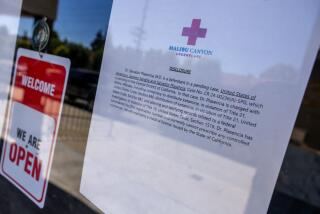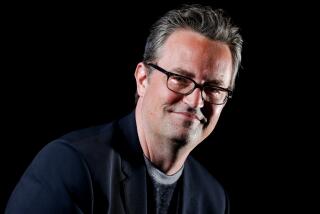Op-Ed: Up to 15% of doctors are drug addicts. I was one of them
- Share via
It wasn’t until the state police and the DEA were sitting in my primary care office that I finally stopped denying that I was hopelessly addicted to prescription opiates. The DEA agent said, “Doc, cut the crap, we know you’ve been writing bad scrips.” The windows in my office didn’t open, otherwise I might have jumped out and fled. As it was, I was charged with three felony counts of fraudulent prescribing.
Physicians are invested with awesome responsibility and trust. We are thought of as invulnerable, as miracle workers, and we’re told, “Heal thyself.” We’re no better at that than the rest of you and in some ways, we’re far worse.
Our problems show up in a long list of troubling statistics, and chief among them is the one that applied to me: Doctors are prone to drug and alcohol abuse. It’s estimated that rates of addiction among the general population run from 8% to 10%; among physicians, the rates start at 10% and rise to 15%. What appears to account for the difference is physician distress, and in the case of drug abuse, plentiful access.
Much has been written about the epidemic of physician burnout, depression and anxiety. Doctors are more than twice as likely to kill themselves as the general population. As many as one-sixth of primary care doctors leave medicine mid-career, an unfathomable waste given the doctor primary-care shortages in the U.S. Practicing medicine has never been easy, and now doctors work faster and longer, with less reward, spending as much time battling insurance companies and maintaining electronic medical records as treating patients. Many physicians say that if they could start over, they wouldn’t choose to become doctors.
Humans in distress have always reached for relief close at hand. In the case of doctors, that’s often prescription medicine. A 2013 study in the Journal of Addiction Medicine revealed that 69% of doctors abused prescription medicine “to relieve stress and physical or emotional pain.” Given how immediately, though superficially and transiently, these pills work, the temptation to use them again and again may become overwhelming. Given how addictive they are, that’s like trying to put out a fire by dumping gasoline on it.
My access to prescription medications was virtually unlimited. Drug companies send doctors free samples. Patients bring in their unused painkillers for disposal. Colleagues freely write a scrip or two as a professional courtesy. And I foolishly made illegal use of my own prescription pad.
When doctors abuse drugs and alcohol, they must be met with compassion and care.
As a doctor slips into the clutches of addiction, he or she only rarely seeks help. Though state medical boards, which are made up of doctors for the most part, should be enlightened enough to treat addiction as a disease, they often handle it more like a crime. Addicted physicians face colossal stigma and the very real possibility they will lose their license if they come forward. Knowing this, troubled doctors tend to stay in the shadows until disaster strikes: a DUI, showing up high in the operating room, or in my case, getting charged with a serious crime.
In most of the country, including Massachusetts, where I practice, the state medical society operates a Physician Health Service. The service cooperates with the medical board and offers resources for distressed doctors. Unfortunately, even if you sign up with such a service voluntarily, there is no assurance that agreeing to treatment and monitoring will forestall board punishments.
By the time I made use of the Massachusetts Physician Health Service, I was serving two years of supervised court probation (my three felony charges were eventually dismissed). I had been dragged, disgraced, in front of the state board where I was interrogated for hours by a hostile, aggressive attorney. I lost my medical license. My marriage ended. I was out of work for almost four years. I finally retrieved my career and my life by dedicating myself to the health service’s rigorous program of counseling, drug testing and workplace monitoring. It lasted for five years.
I’ve been in recovery since 2007. After I regained my medical license, I was asked to join the Physician Health Service as an associate director, helping other addicted doctors. As it turns out, physicians, once they get help, often excel at rehab. According to health service studies, we succeed at rates of 70% to 80%, which for addiction is astronomically high.
My experience on both sides of doctor rehab has taught me that an oversight system that defaults to sanctions and punishment keeps addicted doctors from getting treatment, which is the worst-case scenario for them and their patients. When doctors abuse drugs and alcohol, they must be met with compassion and care. Instead of reflexively revoking or suspending licenses, state medical boards can usually ensure patient safety by keeping doctors at work under careful monitoring. I’ve seen the recovery process return better doctors to productive practice, strengthening the qualities most people want in a caregiver — humility, empathy and patience.
Society has begun to shift from viewing addiction as a moral failing that deserves punishment to understanding it as a disease that can be successfully treated. That’s no less true for physicians than for everyone else.
Peter Grinspoon is a primary care physician in Boston and an instructor at Harvard Medical School. He is the author of “Free Refills: A Doctor Confronts His Addiction.”
MORE FROM OPINION
Legalizing marijuana is a hazy question once you’ve seen addiction up close
Harambe the gorilla dies, meat-eaters grieve
Follow the Opinion section on Twitter @latimesopinionand Facebook
More to Read
A cure for the common opinion
Get thought-provoking perspectives with our weekly newsletter.
You may occasionally receive promotional content from the Los Angeles Times.










